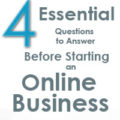Starting an online business is a tempting idea, whether you’re looking to transition away from your current career, or just want to make a little extra cash on the side. The opportunity to grow an income stream and automate sales can be very appealing. But when all your work is dependent on your online business presence, the platform that you create must be efficiently defended from attack.
Website Hackers
Online retailers’ websites face several different types of risk. Hackers could redirect visitors or plant viruses if they gain access to a site. That could frighten shoppers and lower their opinion of your brand and product and may affect your search rankings and site trustworthiness rating. Customer personal details could be compromised, and in a worst-case scenario, financial data can be hijacked. Just read my article about how my site was hacked years ago and the havoc it caused.
Getting Your Social Media Account Hijacked
For media personalities, the risks are a little different. A hijacked account could wipe out or steal high performing content, spread content that puts off fans, or even lock out the content owner, taking away an income stream. If some negative content is spread online, there can be repercussions from sponsors or platforms that automatically penalize bad behavior that violates their terms of service, even if it’s the result of a hack.
Getting Your Trade Secrets Stolen
For consultants and professionals selling services online, the threat can be oriented more around proprietary content and communication channels. Trade secrets or high-value content might be stolen from cloud storage, client work may be hijacked, and website redirects or viruses planted. If your email gets hacked, it can shut down your channel to your clients, keeping you from completing projects and getting new ones. Your billing information may get compromised, redirecting funds to hostile parties, or exposing client financial details. Your professionalism as a brand may be affected by a security breach, damaging client opinions, and trust, especially if your business is at all related to web design, development, or security.
There are several security measures you can take to avert the threats, based on what element of your business you most need to protect.
Backup, Backup, Backup
Professionals and consulting business owners should backup all files in a separate location. Don’t rely on just one server or cloud storage in isolation, in case access gets compromised. Holding your files hostage in exchange for a bitcoin payout is an attack that’s increasing in popularity, and if you have records in more than one location, you can end-run hackers.
Protecting Your Data
Digital security service DocuSign, chaired by entrepreneur Keith Krach, is a solution for documentation safekeeping. It offers a secure digital signature technology that protects your identity and authority on high-value documents like contracts. Adding an extra layer of security on critical documents such as bids, invoices, payments, contracts and trade secrets can protect both you and your clients.
When it comes to protecting financial data, there are multiple loopholes to close. You want to make sure your method of correspondence with your clients is secure, that their payment details and your banking data is protected, and that funds don’t get intercepted. If you’re communicating and processing payments on your website, or moving customers from your website to another payment platform, implement SSL protocol to add a layer of security to critical financial transactions. If you can keep communication and payments on the same platform for customers, it will cut down on the risk. Also, be sure to use secure, reputable payment methods.
Practice Good Password Habits
Keep up to date records of every person who has administrative (login) access to your platforms, including your server, desktop or cloud storage, business software, website or online accounts, and payment platforms. Educate those people on proper password use and encourage (or require) them to change their passwords periodically. If you can limit the number of people with access to your systems, the level of their access, and the likelihood of their access credentials being hacked, you can cut down on security risks.
Keep Your Business Computers and Website Up to Date
Regularly updating your system, software and website is also a key tool in your anti-attack arsenal. Software developers release updates to close established security risks, in addition to offering new or better features, so if don’t keep up to date, you leave established hacking opportunities on the table.
Finally, be sure to install firewall and antivirus protection. It doesn’t offer complete security, but it catches many viruses and hacking attempts. Ensure that servers, individual machines, and your website have specific firewall and antivirus coverage. If you’re working with specialist consultants for your system administration and website development, check in with them to make sure they’ve installed protection and are keeping it up to date.
Final Thoughts
Your online business will continue to thrive if you take steps to protect it from attack. Be vigilant about using different, high-security passwords, install extra security for your website, keep software and antivirus up to date, and use secure platforms whenever possible.









